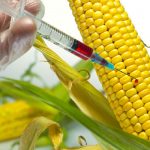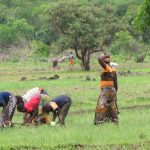29 JUN 2018
African civil society groups align to condemn the Bayer Monsanto merger and the corporate takeover of African food systems.
Why are we saying no?
Because we are dedicated to the cause of food sovereignty, the right of peoples to healthy and culturally appropriate food produced through ecologically sound and sustainable methods, and their right to define their own food and agriculture systems.
Why now?
Because we see countries like Nigeria, Ghana, Kenya, Tanzania, Ethiopia and Swaziland opening their doors wide to GMOs, and other countries following despite the evidence of failure in other African countries. And because we see the two biggest biotech companies Monsanto and Bayer merge to create a massive new threat to African food sovereignty.
What’s wrong with industrial agriculture?
Industrial agriculture involves the intensive production of crops or livestock in conditions intended to maximize production at minimal cost. It uses techniques like mono-cropping a single variety –typically of maize or soya– with intensive use of artificial fertilizers, plant growth regulators, and toxic pesticides. Livestock are often raised on genetically modified animal feed, kept in cramped conditions, and dosed with drugs and hormones to promote rapid growth. The Industrial Food System tells us we must commercialize our agriculture, using hybrid or GM seeds that you have to buy every year, and replace farmers’ complex knowledge with a one-size-fits-all recipe. Experience shows this path leads to poverty, poor health, a degraded environment, high-risk business ventures, loss of biodiversity, and weakened resilience. Small scale farm families are forced off their land as they cannot afford the expensive inputs, while others become ever larger commercial farmers growing cash crops for international markets rather than food for local markets.
What is corporate control of food?
The control of farming, food production, distribution and consumption is becoming more and more concentrated in the hands of fewer and fewer companies like the giant Bayer Monsanto corporation. They are now one of three mega corporations that control two thirds of the world market for commercial farming inputs. This concentration of market control creates monopolies, locking farmers in to the corporate driven technologies, ushering in an era of big data digital farming and new GM technologies, and exposing the limitations of current competition laws protecting famers and consumers. AFSA member, the African Centre for Biodiversity, has published an in-depth analysis. https://acbio.org.za/wp-content/uploads/2017/04/Mega-Mergers-Bayer-Monsanto.pdf
Here in Africa we see more and more policies and laws that support and encourage the corporations to sell their seeds and chemicals. We see diets changing as global fast food chains target urban consumers, people buying more processed food from international supermarket chains, and more people becoming overweight and obese. Longer food supply chains from farm to table are breaking down the connections and relationships between producer and consumer. Corporate control means food is no longer a right, a part of our culture, a source of nutrition and health, a shared celebration; it is just a commodity to be traded for the biggest margin.
What is the alternative?
As we know here in Africa, the real alternative is Agroecology, a people-centred system of sustainable agriculture, combining indigenous knowledge with cutting edge science, making the best use of nature to create healthy communities, and empowering a social movement that resists the corporatization of agriculture.
By contrast with industrial farming, agroecology offers a wide range of sustainable benefits far beyond yields. Where industrial agriculture seeks to simplify, agroecology embraces complexity. Where industrial agriculture aims to eliminate biodiversity, agroecology depends on diversity, and builds upon it. Where industrial agriculture pollutes and degrades, agroecology regenerates and restores, working with nature, not against her.
The UN Food & Agriculture Organisation (FAO) agrees, “High-input, resource-intensive farming systems, which have caused massive deforestation, water scarcities, soil depletion and high levels of greenhouse gas emissions, cannot deliver sustainable food and agricultural production. Needed are Innovative systems that protect and enhance the natural resource base while increasing productivity. Needed is a transformative process towards ‘holistic’ approaches such as agroecology.”
In a world committed to sustainable development goals and phasing out fossil fuels, it’s time to let go of false and failed solutions. It’s time to say NO to the corporate takeover; and say NO to the merger between Bayer and Monsanto. It’s time to support small-scale food producers to build sustainable, resilient, diverse, healthy, productive, and culturally appropriate food systems.
_______________________________________________________________________
AFSA is a broad alliance of civil society actors who are part of the struggle for food sovereignty and agroecology in Africa. It is a network of networks, currently with 35 members active in 50 African countries. These include African food producer networks, African NGO networks, indigenous people’s organizations, faith based organizations, women and youth groups, consumer movements, and international organizations that support the stance of the alliance.
www.afsafrica.org

































